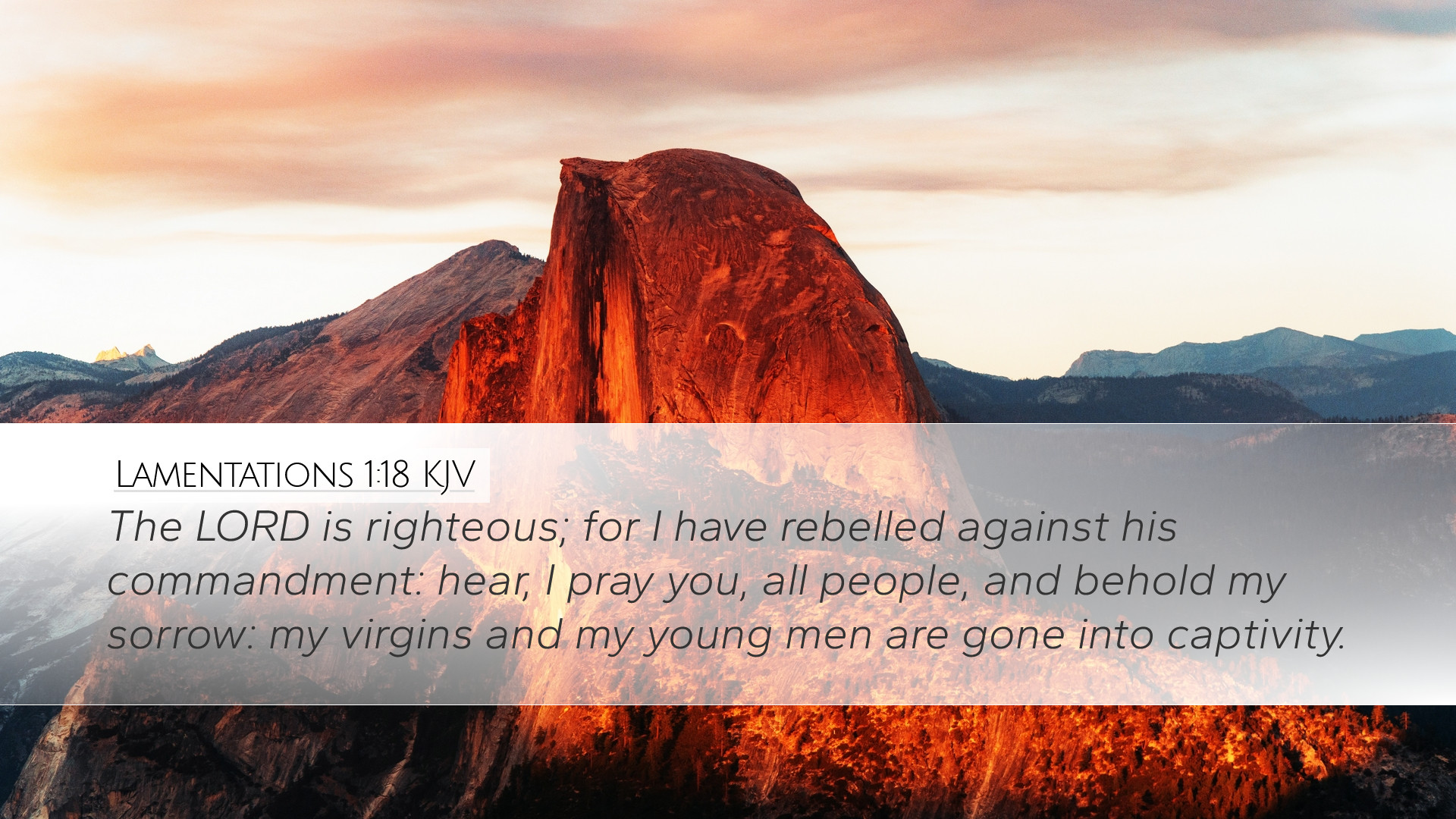Lamentations 1:18
Text of the Verse
"The LORD is righteous; for I have rebelled against his commandment: hear, I pray you, all people, and behold my sorrow: my virgins and my young men are gone into captivity."
Summary and Commentary
This verse encapsulates profound themes of righteousness, rebellion, communal lament, and the devastating consequences of sin. Within this context, we explore various commentaries to glean deeper insights.
Righteousness of the Lord
Matthew Henry emphasizes the declaration of God's righteousness as both a recognition of divine justice and an acceptance of human failure. He posits that the speaker, likely representing Jerusalem or its inhabitants, acknowledges the sovereignty of God in the face of calamity. Henry notes, "God's ways are always just; hence, when calamity befalls His people, it is a direct result of their transgressions."
The Weight of Rebellion
Albert Barnes elaborates on the pains of rebellion against God’s commandments, urging the understanding that such rebellion leads not only to personal sorrow but collective suffering. He remarks, "The acknowledgment of personal sin paves the way for national repentance." This reflects a biblical principle where individual actions can lead to corporate consequences, pointing to Israel’s historical narrative of covenant disobedience.
Collective Lament and Sorrow
Adam Clarke focuses on the communal aspect of lamentation in this verse. He interprets the plea to "hear" and "behold" as an urgent call for attention, not just to individual sorrow, but to the desolation experienced collectively by the people. Clarke argues that "the virgin daughters and young men," representing the future of the nation, signify the loss of potential and hope, leading to despair in the present generation.
Implications for Modern Believers
In reflecting on Lamentations 1:18, contemporary readers are challenged to consider their own lives in light of God's righteousness. Matthew Henry suggests that each one must search their hearts for rebellion against God’s commandments, offering a sobering reminder that God's justice will prevail. Aligning their lives with the principles of God's Word is essential for both spiritual health and communal harmony.
Albert Barnes invites us to reflect on our actions and the broader impact on our communities, particularly regarding how personal sin can lead to societal consequences. The church today must engage in earnest self-examination, seeking to address both personal sin and corporate failings.
Adam Clarke prompts readers to consider their place in God's story, emphasizing the urgency of the message. Believers are called not only to feel sorrow for their own misdeeds but to bear the weight of communal remorse. This aligns with the state of our world today, where collective actions have led to widespread distress.
The Path Forward
As we ponder Lamentations 1:18, there is a strong call to repentance and action.
- Embrace God's Righteousness: Understanding that God’s nature is righteous helps believers recognize the importance of living in obedience to His commandments.
- Respond to Conviction: Just as the speaker laments, modern individuals and communities must own their failings and respond to the Holy Spirit’s prompting towards repentance.
- Engage in Collective Action: The promise of restoration is connected to communal remembrance and action. Churches should foster environments where communal cries for mercy are heard and responded to.
- Seek Restoration with Hope: The sorrow expressed in this verse does not end in despair. The message of the Gospel offers hope that God can redeem and restore His people, even after profound loss.
Conclusion
Lamentations 1:18 serves as a timeless reminder that acknowledging our sins and the righteousness of God is crucial in our journey of faith. The insights from these esteemed commentaries remind us to approach this text not just with sorrow but with a heart ready to seek restoration, build community, and live righteously before our God.


